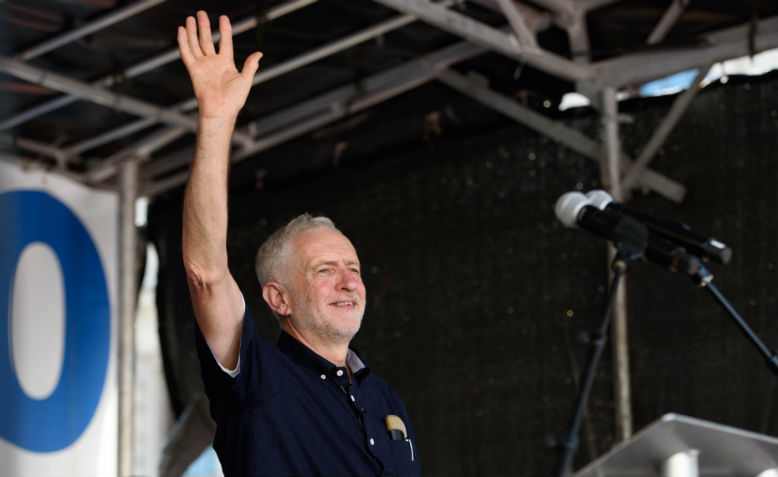 Jeremy Corbyn speaking at #OurNHS70 rally. Photo: Jim Aindow
Jeremy Corbyn speaking at #OurNHS70 rally. Photo: Jim Aindow
Responding to Paul Mason’s latest article, Shabbir Lakha argues that the left needs to be trying to unite working people against austerity, not divide them over Brexit
Paul Mason’s most recent offering can only give encouragement to those who are attacking Jeremy Corbyn.
Mason’s political analysis is largely determined by Brexit, which he says unequivocally is now a right-wing project. He says, “in these circumstances, Labour’s original tactic — to emphasise the economic issues that unite the working poor across Leave and Remain-voting areas, and avoid a culture war over Brexit — can no longer work.” According to Mason, the austerity that is crippling the lives of millions is less important than fighting a “culture war” in which those who still support Leave are “culturally xenophobic” and those who want to Remain are “socially liberal” and the only people Labour should be fighting for.
What is more, Mason fails to provide convincing evidence for many of his claims. He says “a majority of the electorate now supports Remain”. As I explained in this recent article, most polling and the recent EU elections shows the opposite. In general, polls show that the country is still pretty much as divided as it was in 2016 – they are roughly in the same place they were just before the referendum in 2016 – and any rerun of the referendum would likely have the same margin between the winning and losing sides.
He doesn’t feel the need to provide any evidence either for the central assumption of the article that in general Leavers are reactionary and Remainers are progressive. It is the narrative that underpins his analysis and completely fails to look at the real issues facing society or the state of politics that are at the root of the 2016 referendum result. He characterises 17 million people as those who go to Brexit Party rallies and chant ‘Ni-gel’.
In the process, Mason contradicts himself repeatedly. On the one hand, Labour should be representing the “actual” British workforce which includes the industrial workers losing their jobs in Swindon, Scunthorpe and Bridgend – something he claims is entirely down to Brexit. And on the other hand, Labour should be focusing on the big cities and towns and should be ignoring those who voted Leave – like the people of Swindon, Scunthorpe and Bridgend.
On the one hand, opposition to Trident, Nato and the EU are the “perennial obsessions” of people he calls Stalinists, and on the other, one of the urgent questions for Labour according to Mason is whether or not it can “mobilise a movement on the streets to support a left government in office?” It is an insult to those who have dedicated their lives to fighting against nuclear weapons and war to reduce their efforts in this manner. Jeremy Corbyn himself has long been identified with the anti-war left that he is attacking here and this left has played a key role in mobilising people in support and defence of Corbyn.
His sweeping characterisations and writing off of the movements and the radical left, is mirrored by his view that the working class is easily divided into reactionary and progressive based on how they voted in the 2016 referendum. “There is no sociological basis for the claim that a ex-miner in Wigan is somehow “more working class” than a Pakistani taxi driver in Bradford, or a Greek migrant nurse in Bristol”, he says despite the fact that no one on the left is claiming that there is. I wonder where working class immigrants and ethnic minorities, young people and women that voted Leave fit into Mason’s analysis. We must secretly be chanting ‘Ni-gel’ too, I suppose.
What Mason doesn’t understand – or is reluctant to – is that a “winning coalition” is not made up of a pick and mix of the sections of society that he regards as liberal and progressive based on their opinions of one issue. It can only be made up of the people who have suffered most in a society made dysfunctional by austerity. That includes the ex-miner in Wigan, the Pakistani taxi driver in Bradford and the Lithuanian welder in Dudley. This is what the working class today looks like and they do not need to be pitted against each other. The job of socialists, in fact, should be to find the maximum unity amongst them.
1 in 5 people in this country are now living below the poverty line and neither a culture war nor another referendum is going to solve that. As Tony Benn once said, socialists shouldn’t be weathervanes blowing with the wind. The only strategy that can win in the end is to stick to principles and to fight for the whole of the working class, not to decide who is or isn’t worthy.
Paul Mason is being explicit that the route to a second referendum and Remain is via dividing the working class and giving up on some of our historic struggles for bettering society. This should make it clear for anyone on the left that wants to unite to win a Corbyn-led Labour government with an anti-austerity and anti-war programme that a second referendum is not the answer – coming together to demand a general election is.

